English theater began with the miracle and

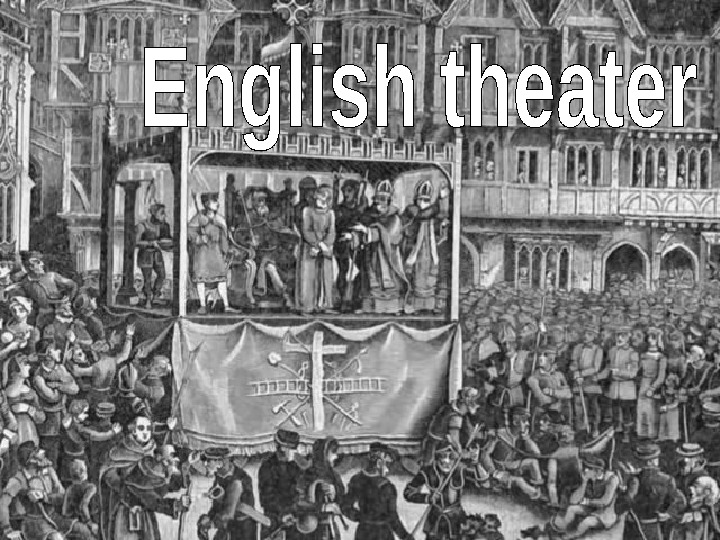
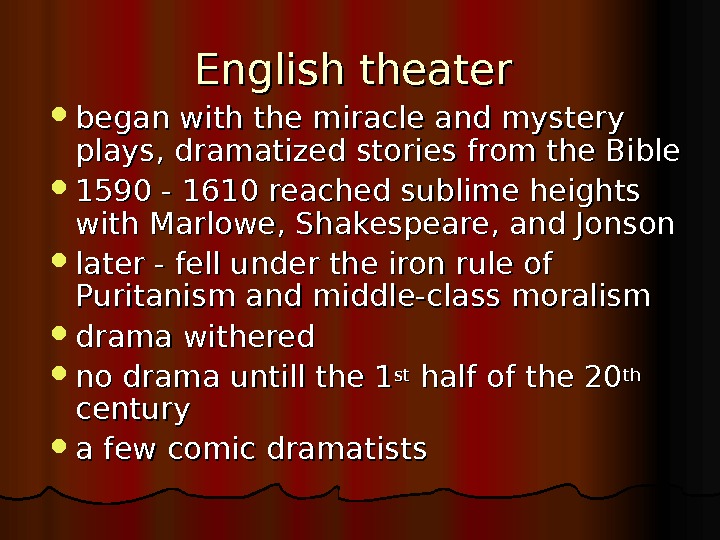
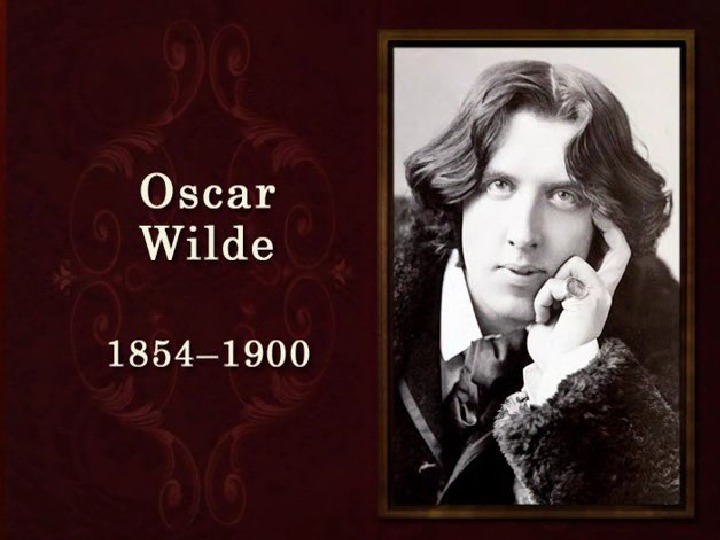
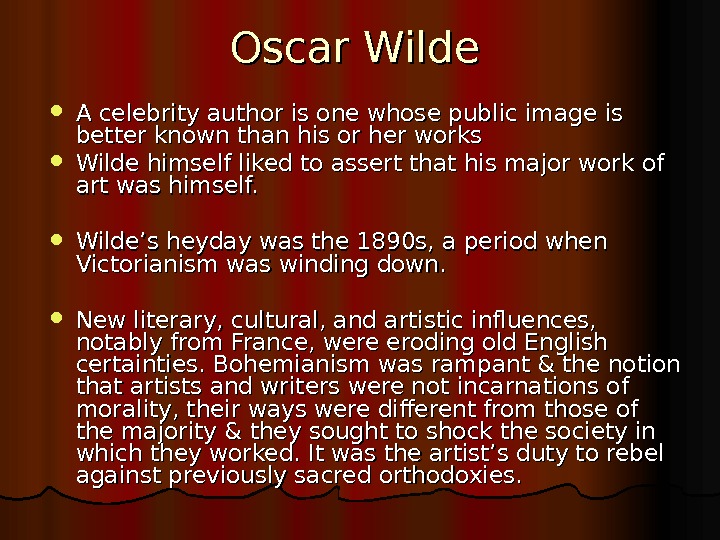
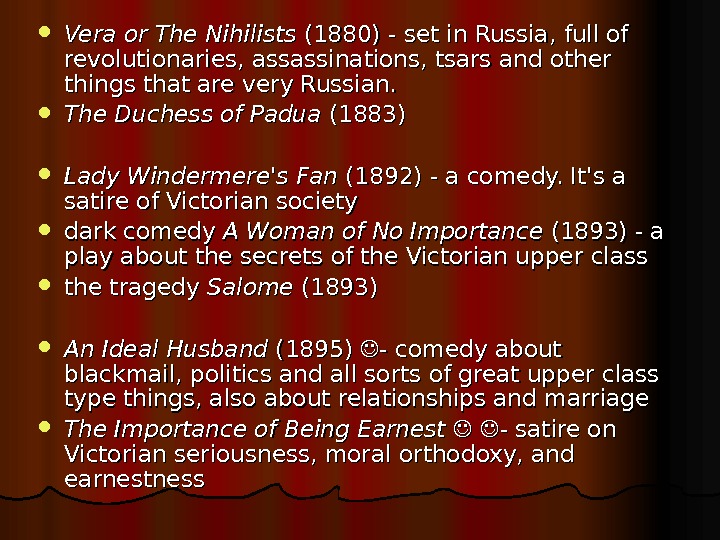
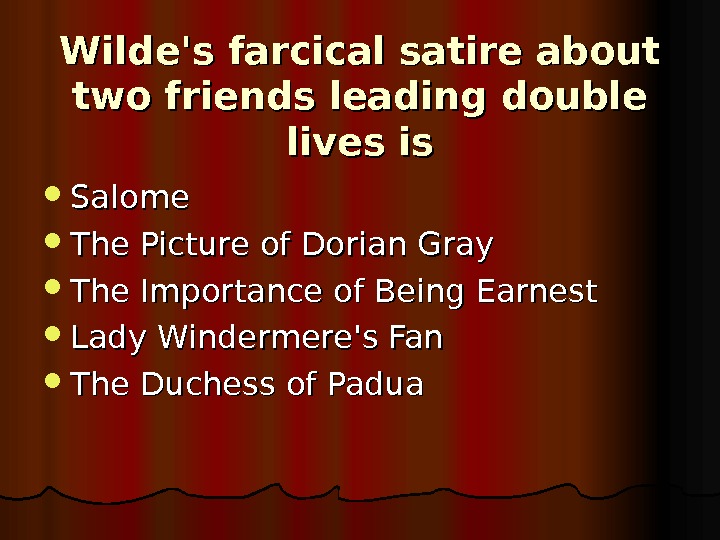
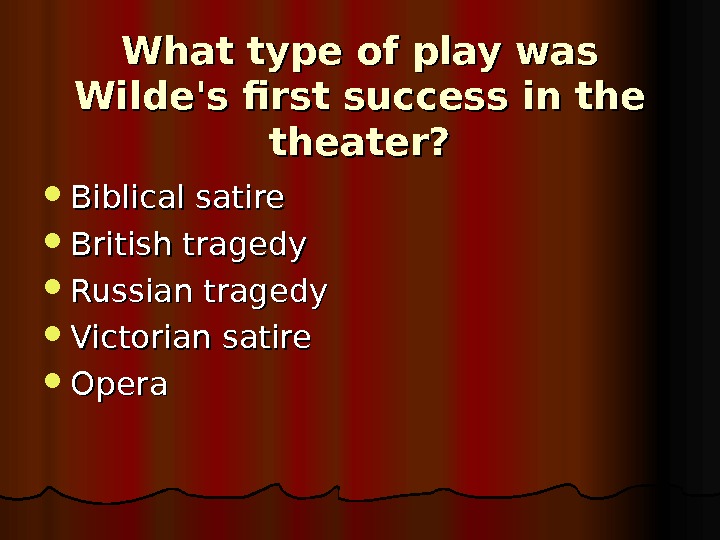
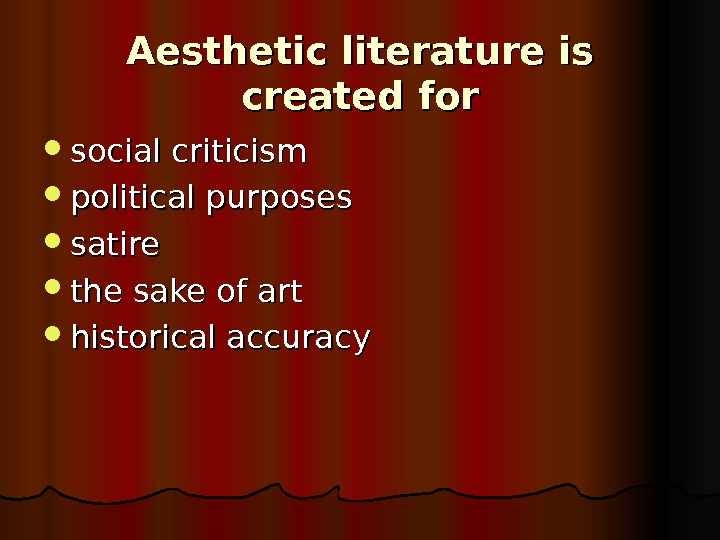
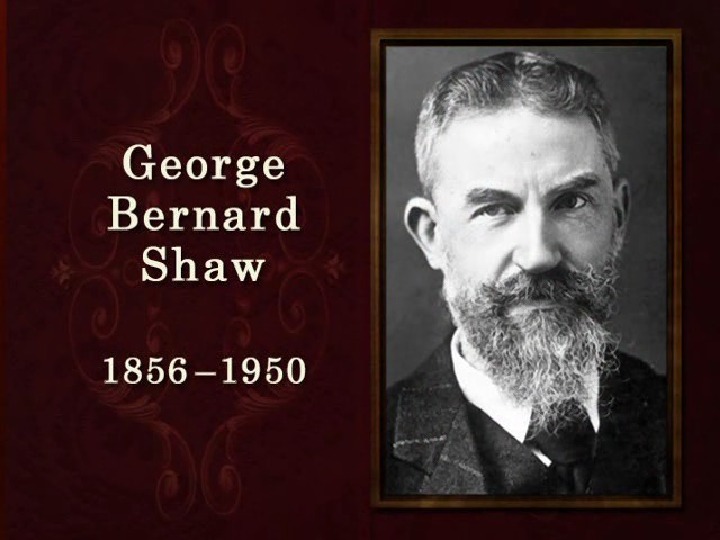
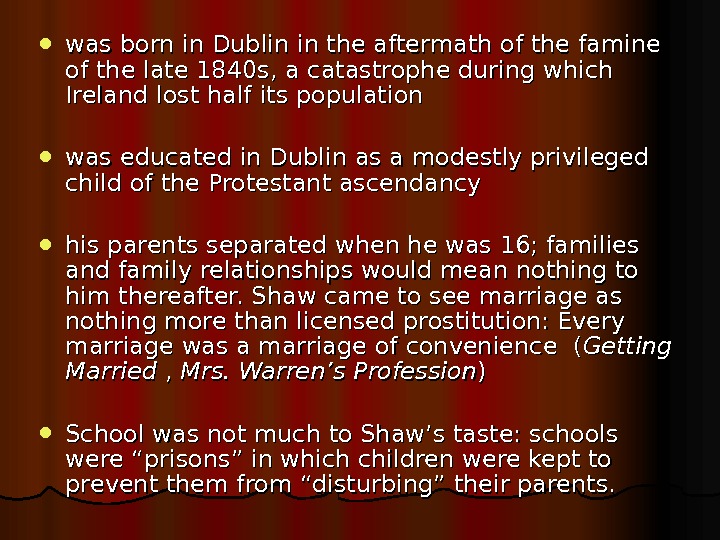
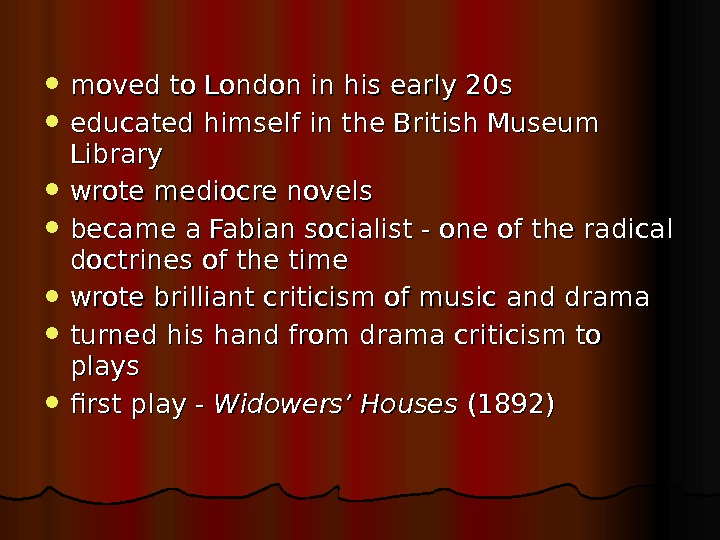
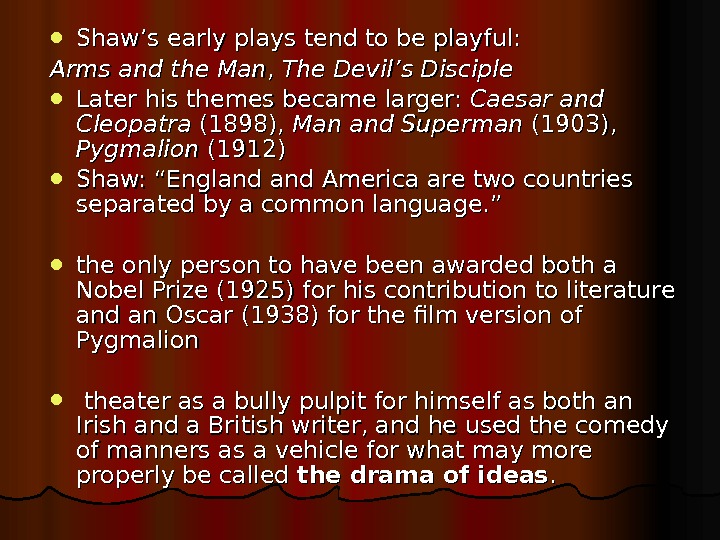

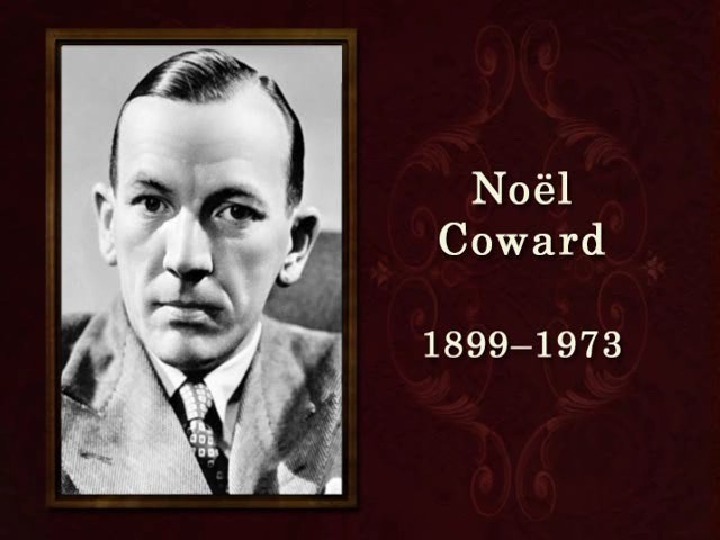
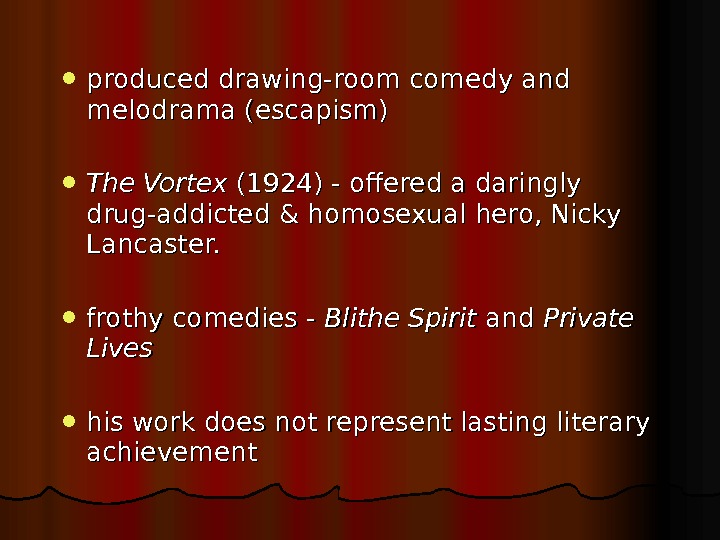
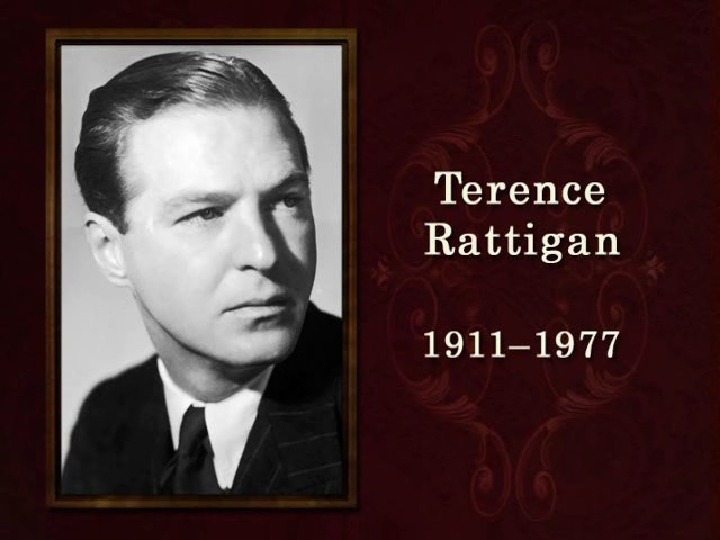
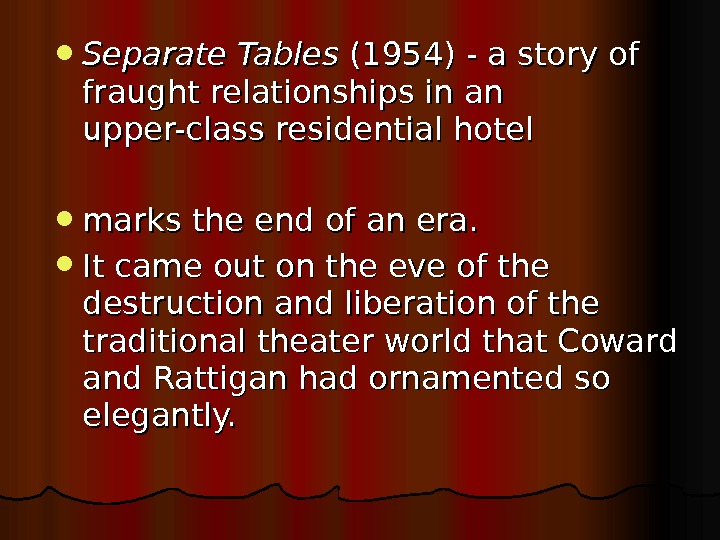

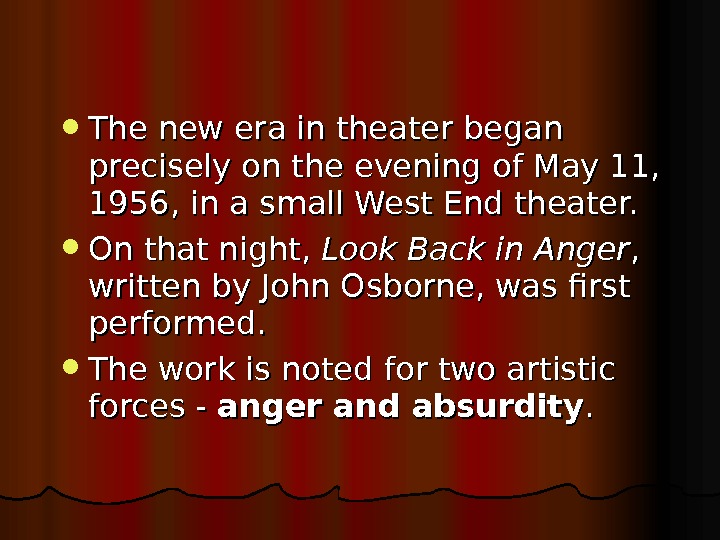
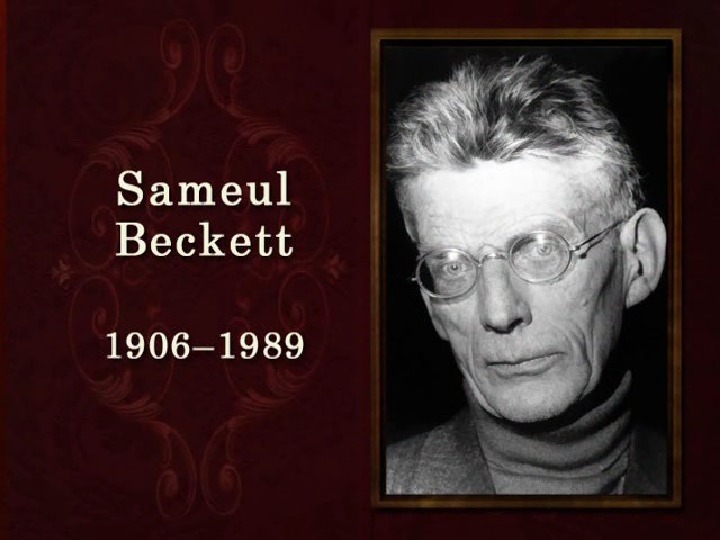
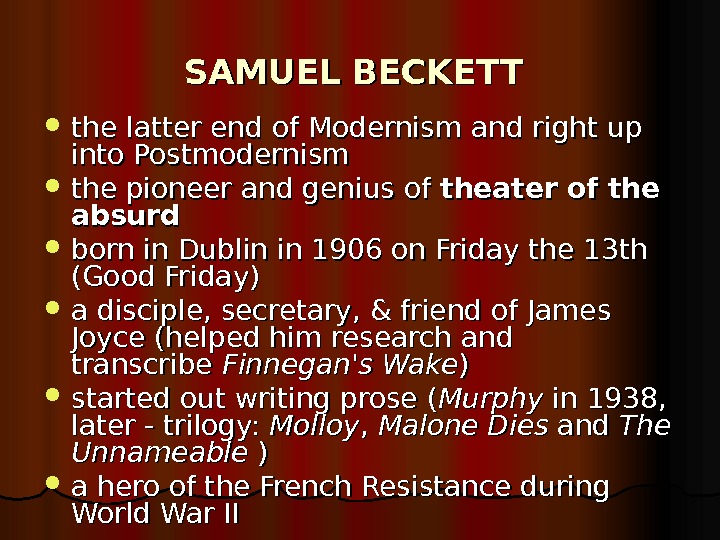
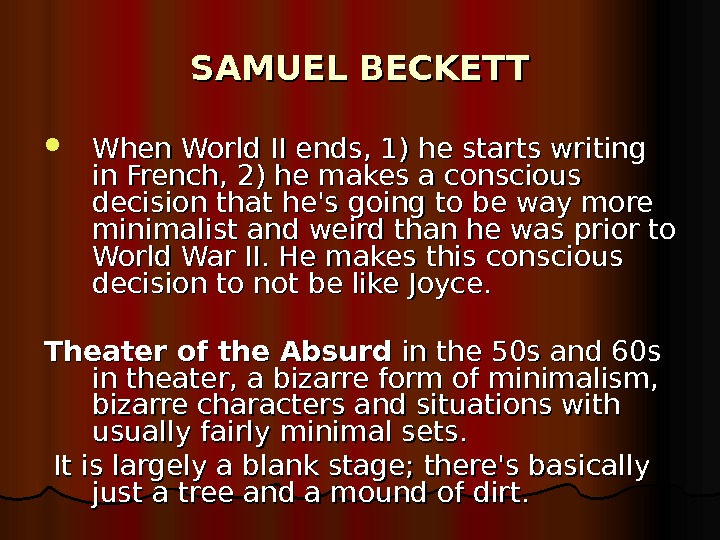
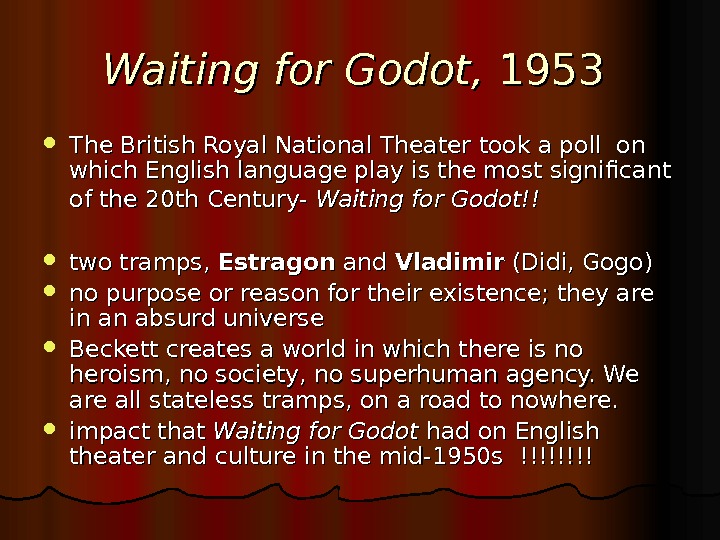
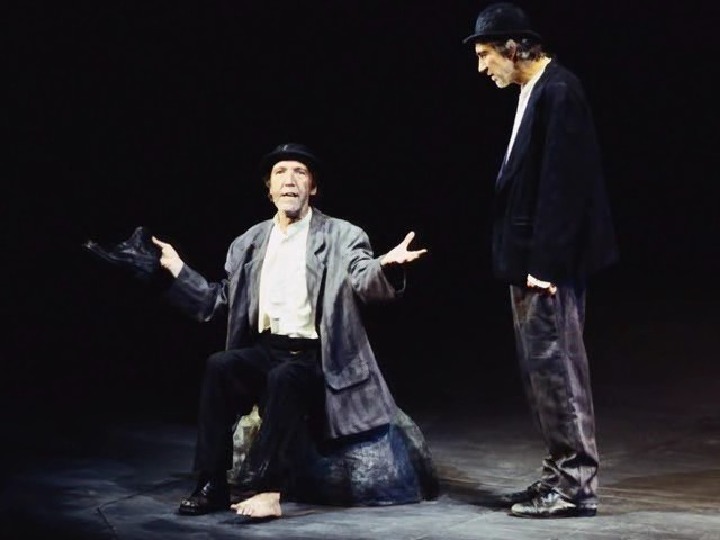
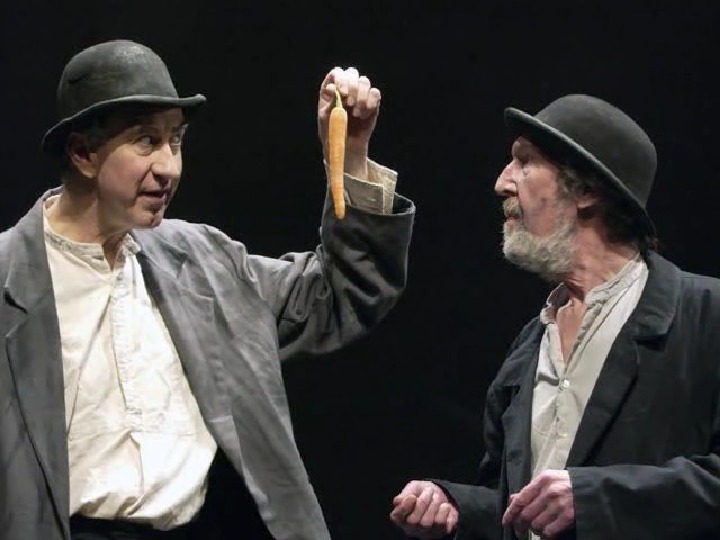
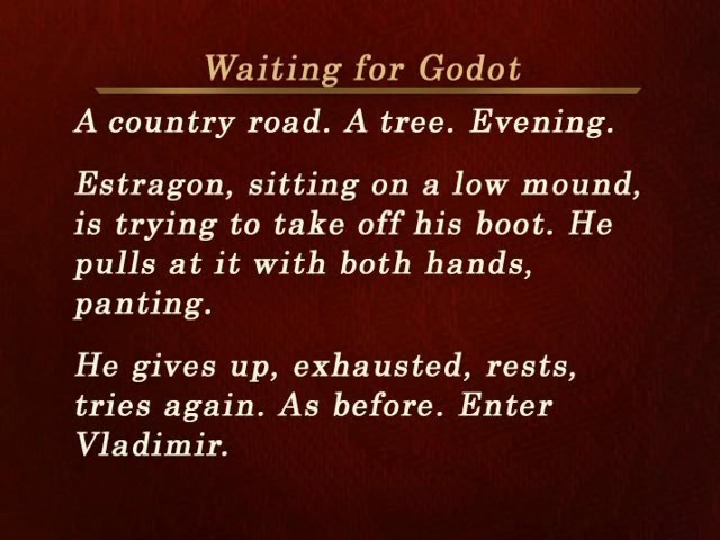
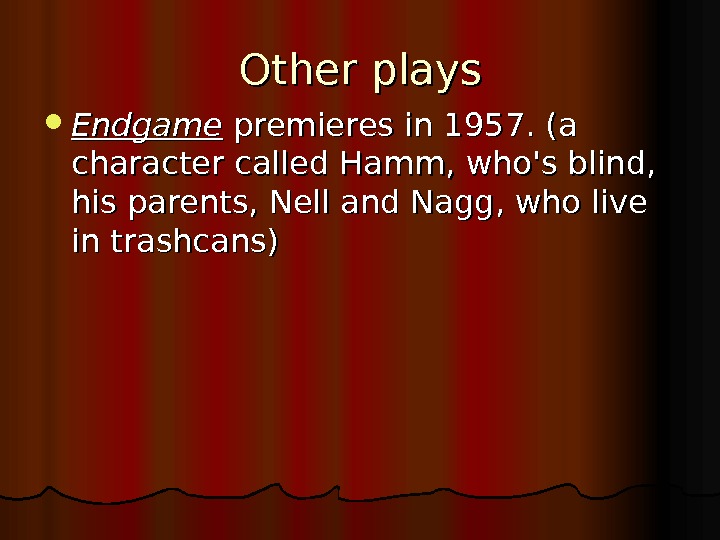
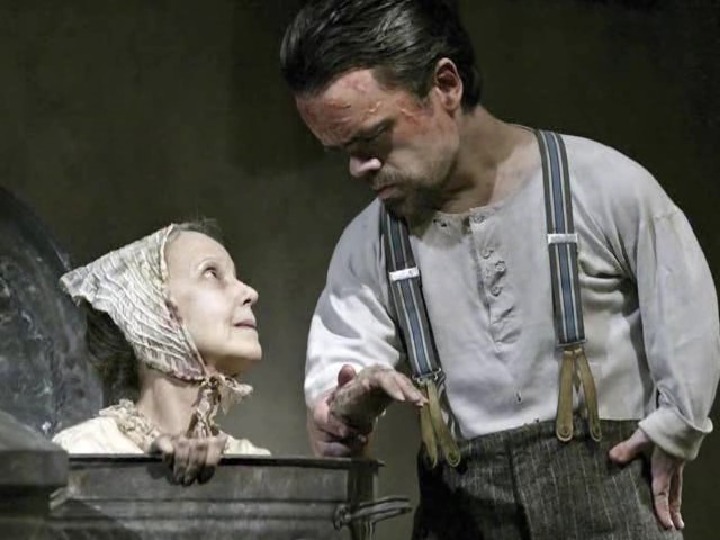
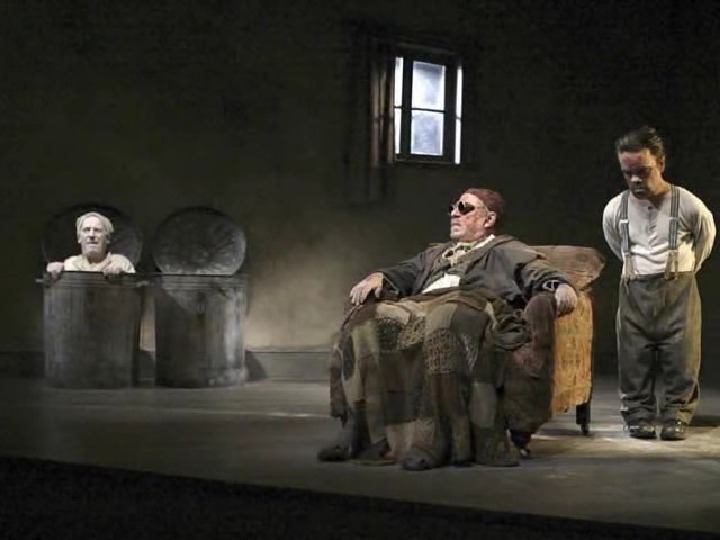
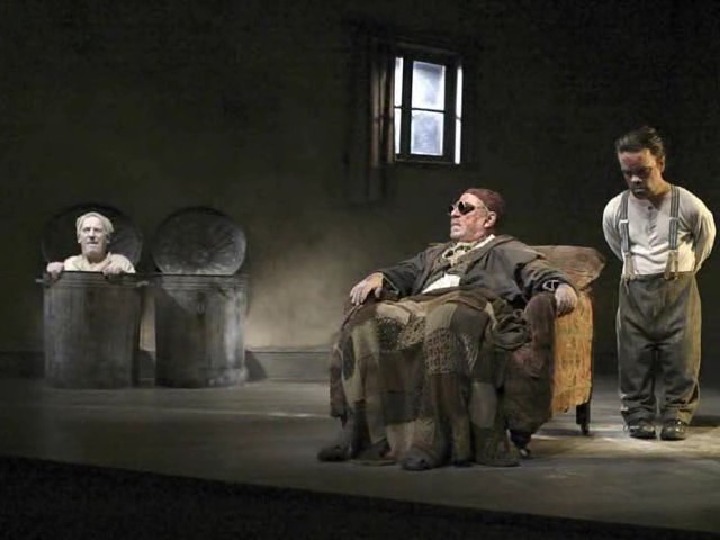
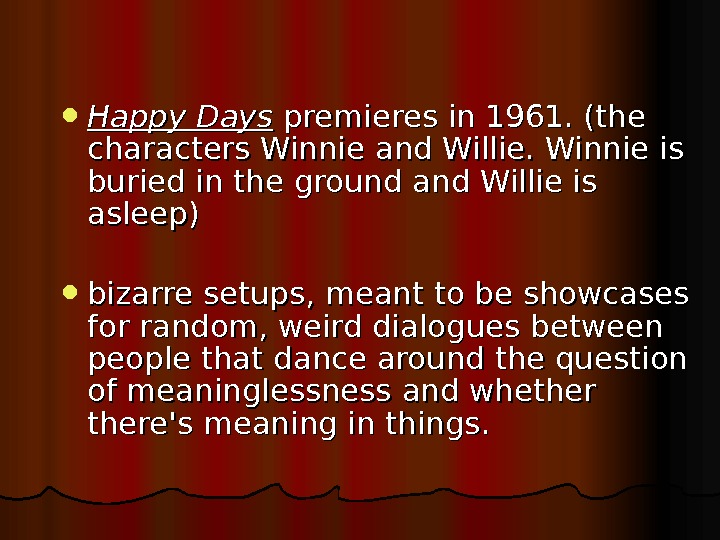
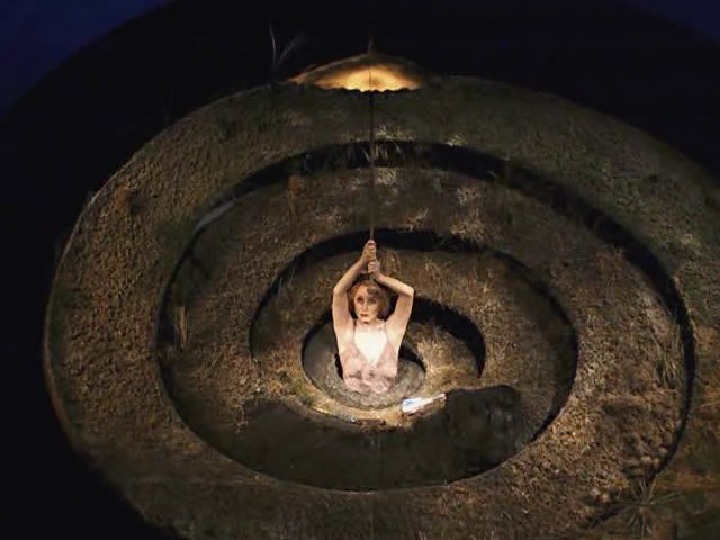
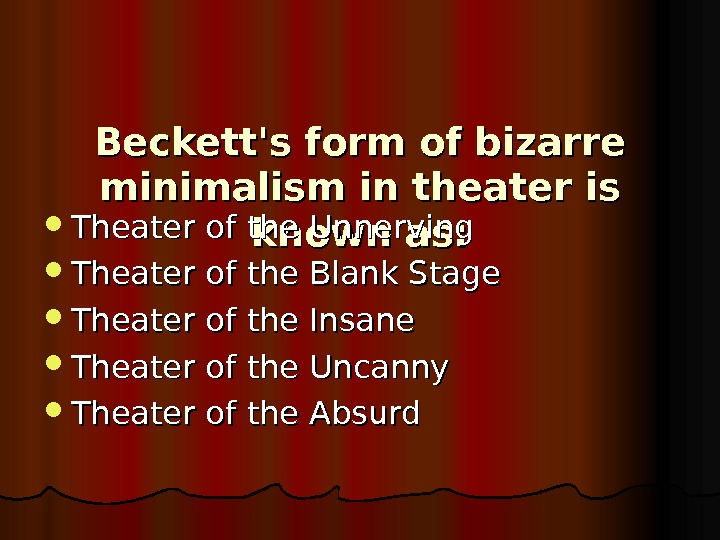
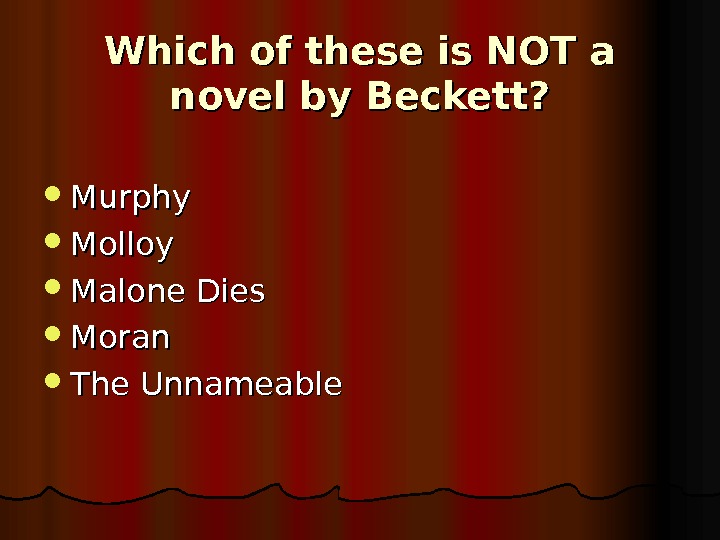

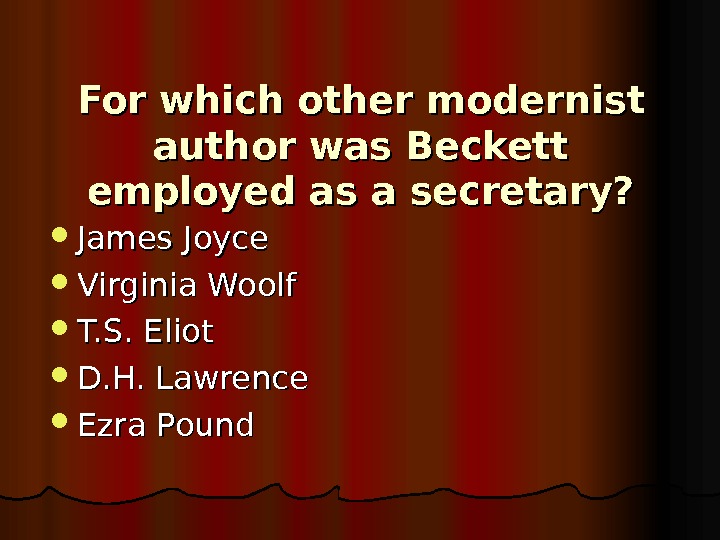

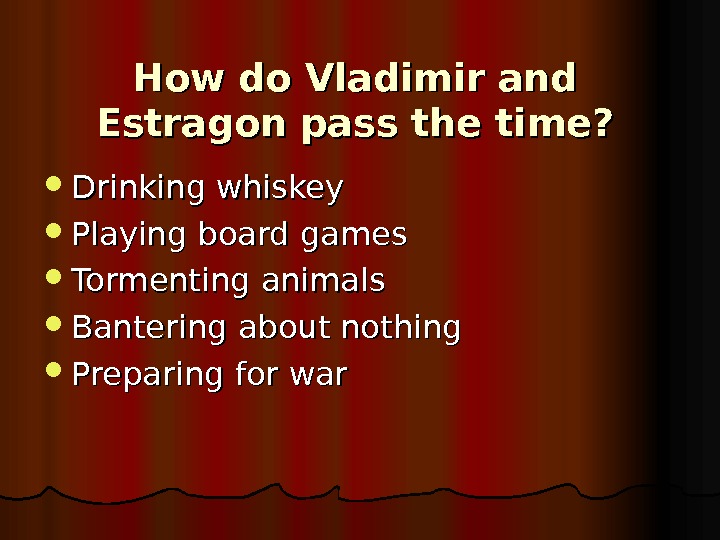
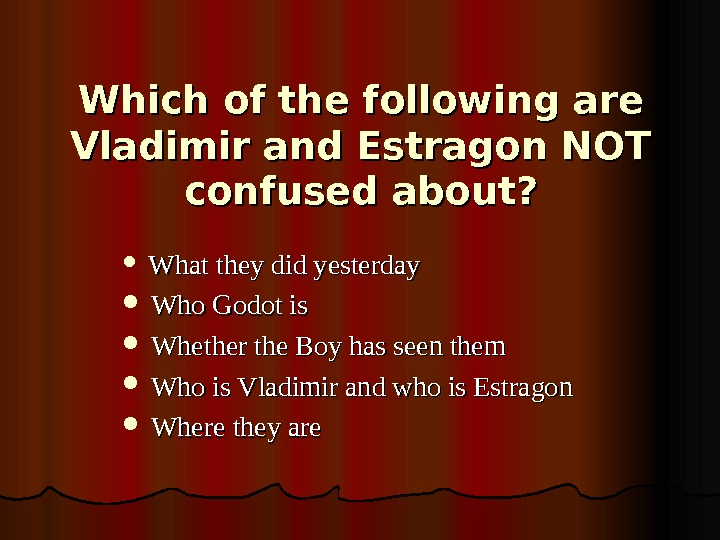
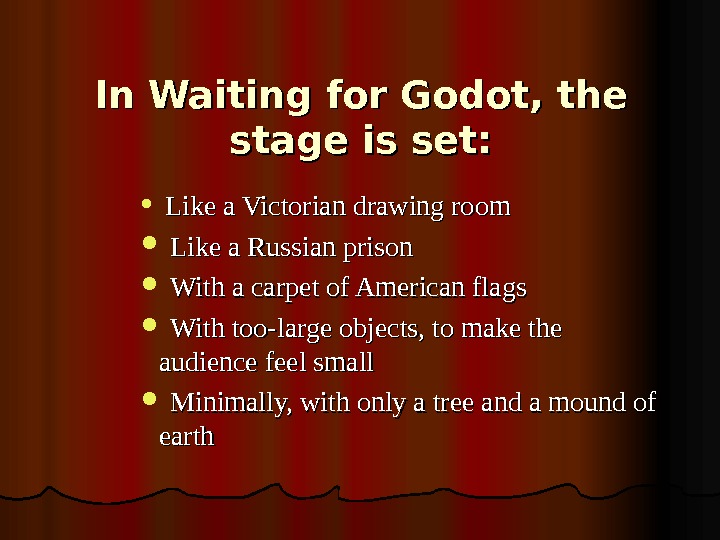
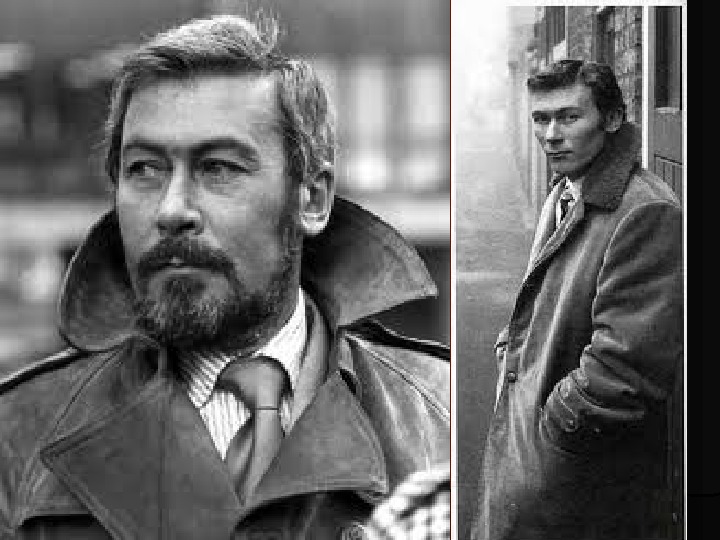
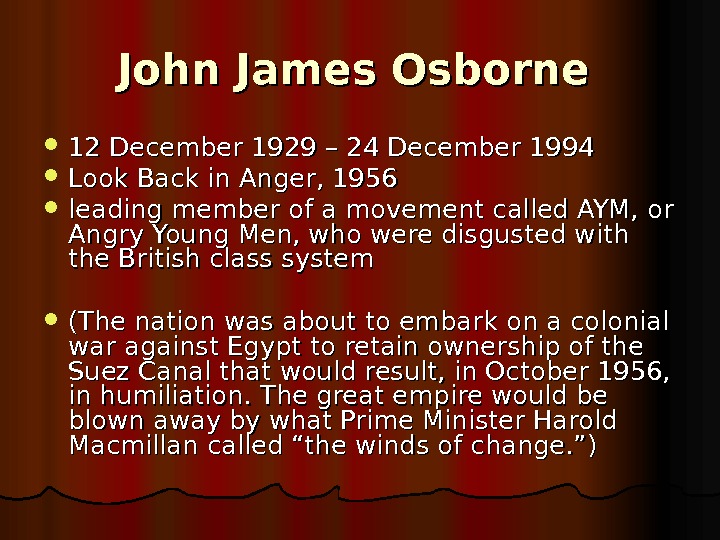
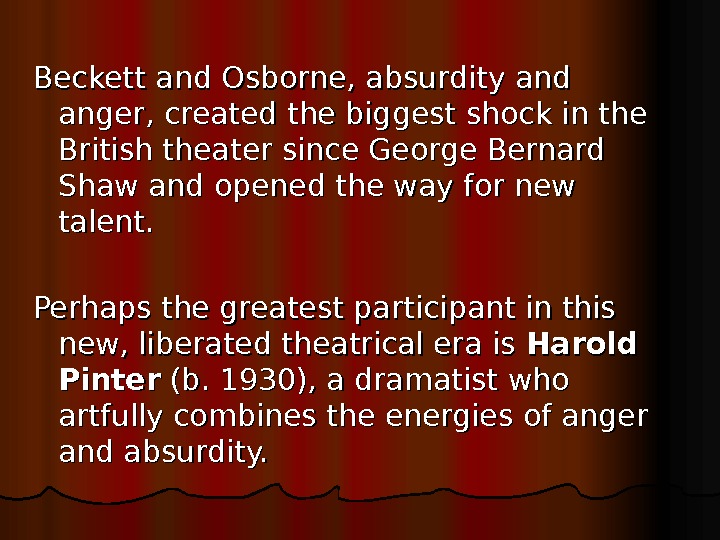
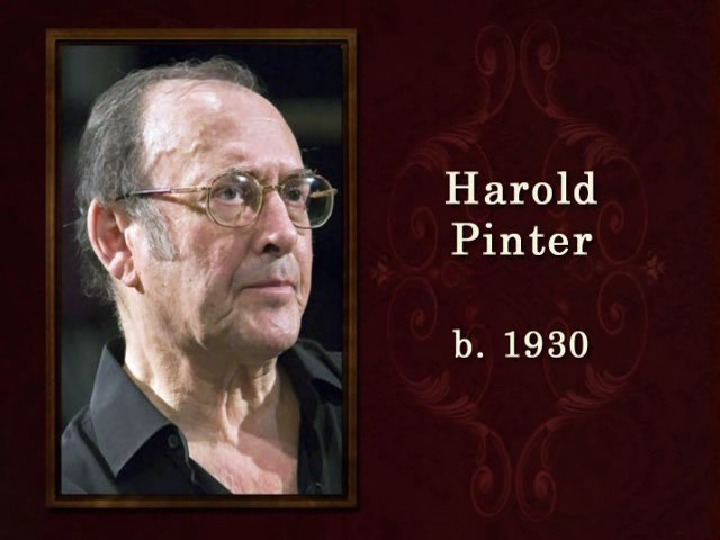
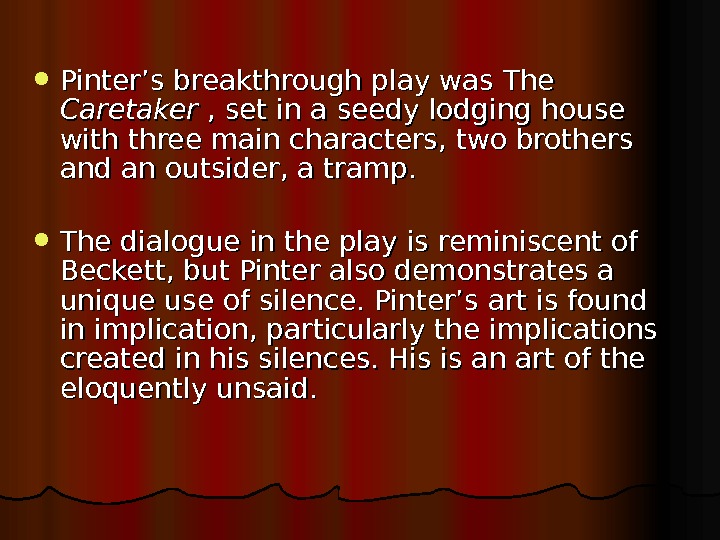
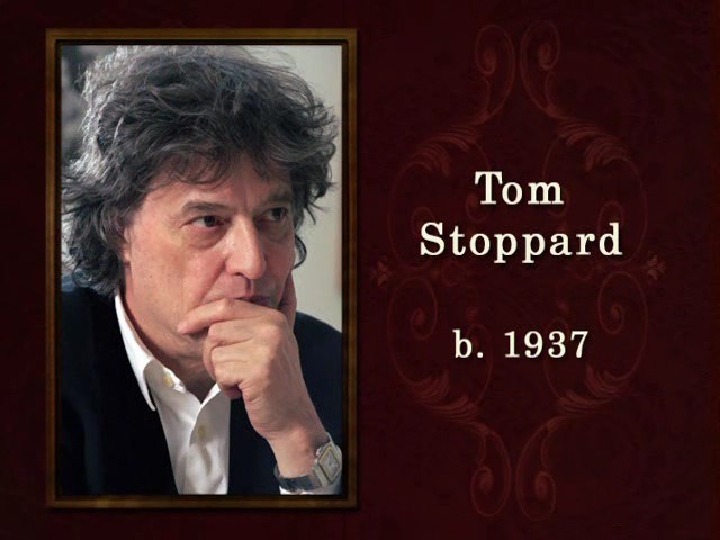
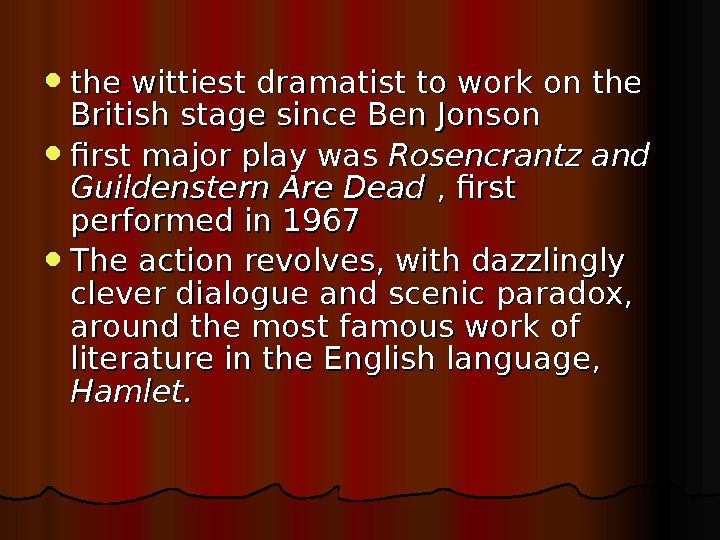
- Размер: 1.3 Mегабайта
- Количество слайдов: 47
Описание презентации English theater began with the miracle and по слайдам

 English theater began with the miracle and mystery plays, dramatized stories from the Bible 1590 — 1610 reached sublime heights with Marlowe, Shakespeare, and Jonson later — fell under the iron rule of Puritanism and middle-class moralism drama withered no drama untill the 1 stst half of the 20 thth century a few comic dramatists
English theater began with the miracle and mystery plays, dramatized stories from the Bible 1590 — 1610 reached sublime heights with Marlowe, Shakespeare, and Jonson later — fell under the iron rule of Puritanism and middle-class moralism drama withered no drama untill the 1 stst half of the 20 thth century a few comic dramatists

 Oscar Wilde A celebrity author is one whose public image is better known than his or her works Wilde himself liked to assert that his major work of art was himself. Wilde’s heyday was the 1890 s, a period when Victorianism was winding down. New literary, cultural, and artistic influences, notably from France, were eroding old English certainties. Bohemianism was rampant & the notion that artists and writers were not incarnations of morality, their ways were different from those of the majority & they sought to shock the society in which they worked. It was the artist’s duty to rebel against previously sacred orthodoxies.
Oscar Wilde A celebrity author is one whose public image is better known than his or her works Wilde himself liked to assert that his major work of art was himself. Wilde’s heyday was the 1890 s, a period when Victorianism was winding down. New literary, cultural, and artistic influences, notably from France, were eroding old English certainties. Bohemianism was rampant & the notion that artists and writers were not incarnations of morality, their ways were different from those of the majority & they sought to shock the society in which they worked. It was the artist’s duty to rebel against previously sacred orthodoxies.
 Veraor. The Nihilists (1880) — — set in Russia, full of revolutionaries, assassinations, tsars and other things that are very Russian. The Duchess of Padua (1883) Lady Windermere’s Fan (1892) — a comedy. It’s a satire of Victorian society dark comedy A Woman of No Importance (1893) — a play about the secrets of the Victorian upper class the tragedy Salome (1893) An Ideal Husband (1895) — comedy about blackmail, politics and all sorts of great upper class type things, also about relationships and marriage The Importance of Being Earnest — satire on Victorian seriousness, moral orthodoxy, and earnestness
Veraor. The Nihilists (1880) — — set in Russia, full of revolutionaries, assassinations, tsars and other things that are very Russian. The Duchess of Padua (1883) Lady Windermere’s Fan (1892) — a comedy. It’s a satire of Victorian society dark comedy A Woman of No Importance (1893) — a play about the secrets of the Victorian upper class the tragedy Salome (1893) An Ideal Husband (1895) — comedy about blackmail, politics and all sorts of great upper class type things, also about relationships and marriage The Importance of Being Earnest — satire on Victorian seriousness, moral orthodoxy, and earnestness
 Wilde’s farcical satire about two friends leading double lives is Salome The Picture of Dorian Gray The Importance of Being Earnest Lady Windermere’s Fan The Duchess of Padua
Wilde’s farcical satire about two friends leading double lives is Salome The Picture of Dorian Gray The Importance of Being Earnest Lady Windermere’s Fan The Duchess of Padua
 What type of play was Wilde’s first success in the theater? Biblical satire British tragedy Russian tragedy Victorian satire Opera
What type of play was Wilde’s first success in the theater? Biblical satire British tragedy Russian tragedy Victorian satire Opera
 Aesthetic literature is created for social criticism political purposes satire the sake of art historical accuracy
Aesthetic literature is created for social criticism political purposes satire the sake of art historical accuracy

 was born in Dublin in the aftermath of the famine of the late 1840 s, a catastrophe during which Ireland lost half its population was educated in Dublin as a modestly privileged child of the Protestant ascendancy his parents separated when he was 16; families and family relationships would mean nothing to him thereafter. Shaw came to see marriage as nothing more than licensed prostitution: Every marriage was a marriage of convenience (( Getting Married , , Mrs. Warren’s Profession )) School was not much to Shaw’s taste: schools were “prisons” in which children were kept to prevent them from “disturbing” their parents.
was born in Dublin in the aftermath of the famine of the late 1840 s, a catastrophe during which Ireland lost half its population was educated in Dublin as a modestly privileged child of the Protestant ascendancy his parents separated when he was 16; families and family relationships would mean nothing to him thereafter. Shaw came to see marriage as nothing more than licensed prostitution: Every marriage was a marriage of convenience (( Getting Married , , Mrs. Warren’s Profession )) School was not much to Shaw’s taste: schools were “prisons” in which children were kept to prevent them from “disturbing” their parents.
 moved to London in his early 20 s educated himself in the British Museum Library wrote mediocre novels became a Fabian socialist — one of the radical doctrines of the time wrote brilliant criticism of music and drama turned his hand from drama criticism to plays first play — Widowers’ Houses (1892)
moved to London in his early 20 s educated himself in the British Museum Library wrote mediocre novels became a Fabian socialist — one of the radical doctrines of the time wrote brilliant criticism of music and drama turned his hand from drama criticism to plays first play — Widowers’ Houses (1892)
 Shaw’s early plays tend to be playful: Arms and the Man , , The Devil’s Disciple Later his themes became larger: Caesar and Cleopatra (1898), Man and Superman (1903), Pygmalion (1912) Shaw: “England and America are two countries separated by a common language. ” the only person to have been awarded both a Nobel Prize (1925) for his contribution to literature and an Oscar (1938) for the film version of Pygmalion theater as a bully pulpit for himself as both an Irish and a British writer, and he used the comedy of manners as a vehicle for what may more properly be called the drama of ideas. .
Shaw’s early plays tend to be playful: Arms and the Man , , The Devil’s Disciple Later his themes became larger: Caesar and Cleopatra (1898), Man and Superman (1903), Pygmalion (1912) Shaw: “England and America are two countries separated by a common language. ” the only person to have been awarded both a Nobel Prize (1925) for his contribution to literature and an Oscar (1938) for the film version of Pygmalion theater as a bully pulpit for himself as both an Irish and a British writer, and he used the comedy of manners as a vehicle for what may more properly be called the drama of ideas. .
 NO DRAMA!
NO DRAMA!

 produced drawing-room comedy and melodrama (escapism) The Vortex (1924) — offered a daringly drug-addicted & homosexual hero, Nicky Lancaster. frothy comedies — Blithe Spirit and Private Lives his work does not represent lasting literary achievement
produced drawing-room comedy and melodrama (escapism) The Vortex (1924) — offered a daringly drug-addicted & homosexual hero, Nicky Lancaster. frothy comedies — Blithe Spirit and Private Lives his work does not represent lasting literary achievement

 Separate Tables (1954) — a story of fraught relationships in an upper-class residential hotel marks the end of an era. It came out on the eve of the destruction and liberation of the traditional theater world that Coward and Rattigan had ornamented so elegantly.
Separate Tables (1954) — a story of fraught relationships in an upper-class residential hotel marks the end of an era. It came out on the eve of the destruction and liberation of the traditional theater world that Coward and Rattigan had ornamented so elegantly.
 NO DRAMA!!!!
NO DRAMA!!!!
 The new era in theater began precisely on the evening of May 11, 1956, in a small West End theater. On that night, Look Back in Anger , , written by John Osborne, was first performed. The work is noted for two artistic forces — anger and absurdity. .
The new era in theater began precisely on the evening of May 11, 1956, in a small West End theater. On that night, Look Back in Anger , , written by John Osborne, was first performed. The work is noted for two artistic forces — anger and absurdity. .

 SAMUEL BECKETT the latter end of Modernism and right up into Postmodernism the pioneer and genius of theater of the absurd born in Dublin in 1906 on Friday the 13 th (Good Friday) a disciple, secretary, & friend of James Joyce (helped him research and transcribe Finnegan’s Wake ) ) started out writing prose (( Murphy in 1938, later — trilogy: Molloy , , Malone Dies andand The Unnameable )) a hero of the French Resistance during World War II
SAMUEL BECKETT the latter end of Modernism and right up into Postmodernism the pioneer and genius of theater of the absurd born in Dublin in 1906 on Friday the 13 th (Good Friday) a disciple, secretary, & friend of James Joyce (helped him research and transcribe Finnegan’s Wake ) ) started out writing prose (( Murphy in 1938, later — trilogy: Molloy , , Malone Dies andand The Unnameable )) a hero of the French Resistance during World War II
 SAMUEL BECKETT When World II ends, 1) he starts writing in French, 2) he makes a conscious decision that he’s going to be way more minimalist and weird than he was prior to World War II. He makes this conscious decision to not be like Joyce. Theater of the Absurd in the 50 s and 60 s in theater, a bizarre form of minimalism, bizarre characters and situations with usually fairly minimal sets. It is largely a blank stage; there’s basically just a tree and a mound of dirt.
SAMUEL BECKETT When World II ends, 1) he starts writing in French, 2) he makes a conscious decision that he’s going to be way more minimalist and weird than he was prior to World War II. He makes this conscious decision to not be like Joyce. Theater of the Absurd in the 50 s and 60 s in theater, a bizarre form of minimalism, bizarre characters and situations with usually fairly minimal sets. It is largely a blank stage; there’s basically just a tree and a mound of dirt.
 Waiting for Godot, 1953 The British Royal National Theater took a poll on which English language play is the most significant of the 20 th Century- Waiting for Godot!! two tramps, Estragon and Vladimir (Didi, Gogo) no purpose or reason for their existence; they are in an absurd universe Beckett creates a world in which there is no heroism, no society, no superhuman agency. We are all stateless tramps, on a road to nowhere. impact that Waiting for Godot had on English theater and culture in the mid-1950 s !!!!!!!!
Waiting for Godot, 1953 The British Royal National Theater took a poll on which English language play is the most significant of the 20 th Century- Waiting for Godot!! two tramps, Estragon and Vladimir (Didi, Gogo) no purpose or reason for their existence; they are in an absurd universe Beckett creates a world in which there is no heroism, no society, no superhuman agency. We are all stateless tramps, on a road to nowhere. impact that Waiting for Godot had on English theater and culture in the mid-1950 s !!!!!!!!



 Other plays Endgame premieres in 1957. (a character called Hamm, who’s blind, his parents, Nell and Nagg, who live in trashcans)
Other plays Endgame premieres in 1957. (a character called Hamm, who’s blind, his parents, Nell and Nagg, who live in trashcans)



 Happy Days premieres in 1961. (the characters Winnie and Willie. Winnie is buried in the ground and Willie is asleep) bizarre setups, meant to be showcases for random, weird dialogues between people that dance around the question of meaninglessness and whethere’s meaning in things.
Happy Days premieres in 1961. (the characters Winnie and Willie. Winnie is buried in the ground and Willie is asleep) bizarre setups, meant to be showcases for random, weird dialogues between people that dance around the question of meaninglessness and whethere’s meaning in things.

 Beckett’s form of bizarre minimalism in theater is known as: Theater of the Unnerving Theater of the Blank Stage Theater of the Insane Theater of the Uncanny Theater of the Absurd
Beckett’s form of bizarre minimalism in theater is known as: Theater of the Unnerving Theater of the Blank Stage Theater of the Insane Theater of the Uncanny Theater of the Absurd
 Which of these is NOT a novel by Beckett? Murphy Molloy Malone Dies Moran The Unnameable
Which of these is NOT a novel by Beckett? Murphy Molloy Malone Dies Moran The Unnameable
 Though born in Ireland and a native speaker of English, Beckett wrote many of his works in which language? Gaelic Italian German French Russian
Though born in Ireland and a native speaker of English, Beckett wrote many of his works in which language? Gaelic Italian German French Russian
 For which other modernist author was Beckett employed as a secretary? James Joyce Virginia Woolf T. S. Eliot D. H. Lawrence Ezra Pound
For which other modernist author was Beckett employed as a secretary? James Joyce Virginia Woolf T. S. Eliot D. H. Lawrence Ezra Pound
 Waiting for Godot, Endgame, and Happy Days all premiered within which of the following decades? 1950 -1970 1910 -1930 -1950 1970 -1990 —
Waiting for Godot, Endgame, and Happy Days all premiered within which of the following decades? 1950 -1970 1910 -1930 -1950 1970 -1990 —
 How do Vladimir and Estragon pass the time? Drinking whiskey Playing board games Tormenting animals Bantering about nothing Preparing for war
How do Vladimir and Estragon pass the time? Drinking whiskey Playing board games Tormenting animals Bantering about nothing Preparing for war
 Which of the following are Vladimir and Estragon NOT confused about? What they did yesterday Who Godot is Whether the Boy has seen them Who is Vladimir and who is Estragon Where they are
Which of the following are Vladimir and Estragon NOT confused about? What they did yesterday Who Godot is Whether the Boy has seen them Who is Vladimir and who is Estragon Where they are
 In Waiting for Godot, the stage is set: Like a Victorian drawing room Like a Russian prison With a carpet of American flags With too-large objects, to make the audience feel small Minimally, with only a tree and a mound of earth
In Waiting for Godot, the stage is set: Like a Victorian drawing room Like a Russian prison With a carpet of American flags With too-large objects, to make the audience feel small Minimally, with only a tree and a mound of earth

 John James Osborne 12 December 1929 – 24 December 1994 Look Back in Anger, 1956 leading member of a movement called AYM, or Angry Young Men, who were disgusted with the British class system (The nation was about to embark on a colonial war against Egypt to retain ownership of the Suez Canal that would result, in October 1956, in humiliation. The great empire would be blown away by what Prime Minister Harold Macmillan called “the winds of change. ”)
John James Osborne 12 December 1929 – 24 December 1994 Look Back in Anger, 1956 leading member of a movement called AYM, or Angry Young Men, who were disgusted with the British class system (The nation was about to embark on a colonial war against Egypt to retain ownership of the Suez Canal that would result, in October 1956, in humiliation. The great empire would be blown away by what Prime Minister Harold Macmillan called “the winds of change. ”)
 Beckett and Osborne, absurdity and anger, created the biggest shock in the British theater since George Bernard Shaw and opened the way for new talent. Perhaps the greatest participant in this new, liberated theatrical era is Harold Pinter (b. 1930), a dramatist who artfully combines the energies of anger and absurdity.
Beckett and Osborne, absurdity and anger, created the biggest shock in the British theater since George Bernard Shaw and opened the way for new talent. Perhaps the greatest participant in this new, liberated theatrical era is Harold Pinter (b. 1930), a dramatist who artfully combines the energies of anger and absurdity.

 Pinter’s breakthrough play was The Caretaker , set in a seedy lodging house with three main characters, two brothers and an outsider, a tramp. The dialogue in the play is reminiscent of Beckett, but Pinter also demonstrates a unique use of silence. Pinter’s art is found in implication, particularly the implications created in his silences. His is an art of the eloquently unsaid.
Pinter’s breakthrough play was The Caretaker , set in a seedy lodging house with three main characters, two brothers and an outsider, a tramp. The dialogue in the play is reminiscent of Beckett, but Pinter also demonstrates a unique use of silence. Pinter’s art is found in implication, particularly the implications created in his silences. His is an art of the eloquently unsaid.

 the wittiest dramatist to work on the British stage since Ben Jonson first major play was Rosencrantz and Guildenstern Are Dead , first performed in 1967 The action revolves, with dazzlingly clever dialogue and scenic paradox, around the most famous work of literature in the English language, Hamlet.
the wittiest dramatist to work on the British stage since Ben Jonson first major play was Rosencrantz and Guildenstern Are Dead , first performed in 1967 The action revolves, with dazzlingly clever dialogue and scenic paradox, around the most famous work of literature in the English language, Hamlet.

